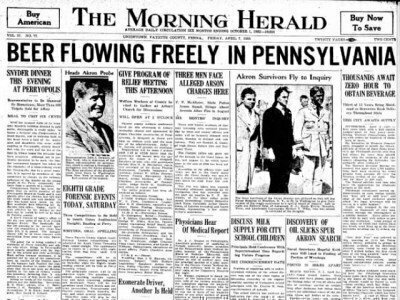April 7 is a day celebrated nationally by beer lovers as a big anniversary near the end of Prohibition in 1933 when legal beer sales returned in the United States for the first time in 13 years.
 Prohibition was one of the great constitutional experiments of the 20th century. Between 1919, when the 18th Amendment banned the sale, making and transportation of booze, and late 1933, when the 21st Amendment repealed the 18th Amendment, Americans found many ways to keep drinking with the help of a few unsavory friends and some resourceful home brewing techniques.
Prohibition was one of the great constitutional experiments of the 20th century. Between 1919, when the 18th Amendment banned the sale, making and transportation of booze, and late 1933, when the 21st Amendment repealed the 18th Amendment, Americans found many ways to keep drinking with the help of a few unsavory friends and some resourceful home brewing techniques.
With the election of Franklin D. Roosevelt in November 1932, Prohibition was dealt a fatal blow. The new Congress made it a priority to repeal anti-alcohol statutes, but even at a fast pace, it would take months to draft a constitutional amendment to cover all intoxicating spirits.
The Roosevelt administration faced a thirsty American public that also dealt with a crippling Depression. As a compromise or interim solution, the President and Congress found a way to bring beer and wine back until the 21st Amendment could legalize all forms of liquor.
Roosevelt signed the Cullen-Harrison Act on March 22, 1933. It amended the much-hated Volstead Act of 1919, which was the act of Congress that enabled the 18th Amendment and Prohibition. Back in 1919, some of the politicians who voted for Prohibition assumed that beer and wine sales wouldn’t be banned – just hard liquors – until Prohibitionists used the Volstead Act to broaden the booze ban.
The Cullen-Harrison Act allowed people to buy and drink low-alcohol content beer and wine in public, but it didn’t go into effect until April 7.
On that fateful day, large headlines in newspapers across the nation said the beer was back as the taps opened in 19 states. In St. Louis, the Budweiser Clydesdales made their first public appearance as they pulled a beer wagon through the city.
In Washington, the owner of the Abner-Drury Brewery ordered a guarded truck to depart at 12:01 a.m. for the White House, with two cases of beer for President Roosevelt. The shipment arrived along with a local press contingent, only to discover that Roosevelt was asleep. The Marine who was guarding the beer opened the first symbolic beer bottle and drank it so that the press could get photographs. Later, the President sent the beer cases to the National Press Club.
In Chicago, an estimated $5 million in beer sales happened on April 7, 1933. There were few reports of arrests. In Hollywood, actress Jean Harlow christened a beer delivery truck.
The Cullen-Harrison Act didn’t have a long lifespan. It was voided when Utah became the 36th state to ratify the 21st Amendment in December 1933.






